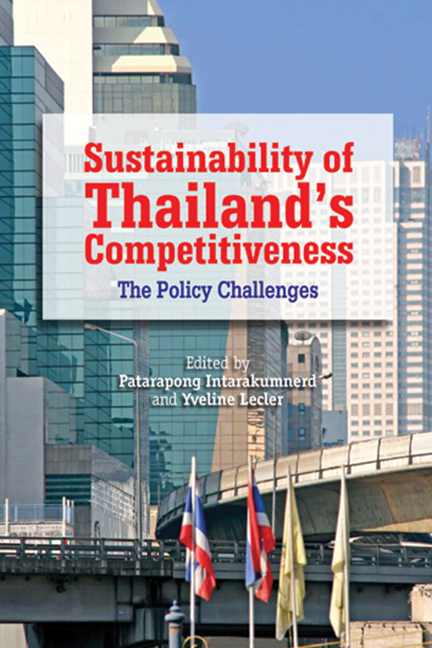Book contents
- Frontmatter
- Contents
- Preface
- Abbreviations
- Contributors
- Introduction
- Part I Thailand's Industrial Development: General Views
- 1 FDI in Thailand: The High Road to Industrial Diversification Revisited
- 2 Catching Up or Falling Behind: Thailand's Industrial Development from the National Innovation System Perspective
- 3 Industrial Upgrading and Educational Upgrading: Two Critical Issues for Thailand
- Part II The Roles of Institutions: Clusters and Industrial Estates
- Part III Firms and Government New Initiatives: The Industry Analysis
- Index
3 - Industrial Upgrading and Educational Upgrading: Two Critical Issues for Thailand
from Part I - Thailand's Industrial Development: General Views
Published online by Cambridge University Press: 21 October 2015
- Frontmatter
- Contents
- Preface
- Abbreviations
- Contributors
- Introduction
- Part I Thailand's Industrial Development: General Views
- 1 FDI in Thailand: The High Road to Industrial Diversification Revisited
- 2 Catching Up or Falling Behind: Thailand's Industrial Development from the National Innovation System Perspective
- 3 Industrial Upgrading and Educational Upgrading: Two Critical Issues for Thailand
- Part II The Roles of Institutions: Clusters and Industrial Estates
- Part III Firms and Government New Initiatives: The Industry Analysis
- Index
Summary
Thailand can no longer rely on cheap labour and fiscal incentives to maintain a continuous flow of foreign direct investment (FDI) which, as Chapter 1 has shown, has been one of its major engines of growth. In neighbouring Asian countries, multinational firms can find cheaper labour and more tax exemptions, while developed countries offer better competitive advantages in terms of knowledge, productive organization and infrastructure. To free itself from being sandwiched, Thailand must upgrade its industrial base and improve its productivity. But this is only possible if Thailand upgrades its education and scientific systems at the same time and combine them in a coherent way, which is not the case today. Primary education is now universal, but not secondary education, and higher education does not play the role that one could expect in developing scientific capabilities. What is worse, the problem is not only quantitative, but also qualitative. The quality of education in Thailand is poor for a number of reasons among which are social inequalities, too much emphasis given to learning by rote of past and sometimes dogmatic knowledge, a shortage of skilled teachers, and above all, the lack of critical thinking and initiative, which are so important for creativity, and in particular, scientific creativity. The education system also suffers from an institutional disorganization that the ongoing decentralization reform will worsen. Much the same can be said of higher education. The absence of a long-term policy on the part of the ministry of education and the ministry of science, and the excessive importance placed on the autonomy of universities make it nearly impossible to organize a coherent and national supply of scientists and engineers capable of satisfying the needs of private companies and contributing to the accumulation of scientific knowledge for converging towards the establishment of the kind of national innovation system discussed in the previous chapter. This does not mean that Thailand cannot change the present situation.
- Type
- Chapter
- Information
- Sustainability of Thailand's CompetitivenessThe Policy Challenges, pp. 78 - 126Publisher: ISEAS–Yusof Ishak InstitutePrint publication year: 2010

